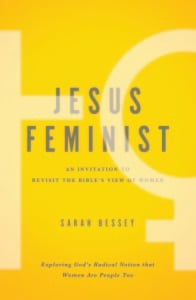Of all the things that have come as a result of the Church’s gender debates, nothing must excite Christian publishers more than the boom in writing devoted to women finding their place in God’s kingdom. And it’s only beginning. The first generation reared entirely within those debates is coming of age, putting pen to paper (or fingers to keyboard), and telling their stories. This phenomenon became undeniable last October when the controversy surrounding Rachel Held Evan’s A Year of Biblical Womanhood propelled it to the New York Times’ Best Sellers list. And now, almost exactly a year later, Sarah Bessey offers the latest in this growing genre with her first book, Jesus Feminist: An Invitation to Revisit the Bible’s View of Women.
Bessey is a blogger, conference speaker, mother of three, and self-described “happy-clappy Jesus lover.” She carries her passion and intimate style into Jesus Feminist, often writing directly to her reader (at times even calling her “luv” and “friend”). In this, Bessey aligns herself not only with the ideology of past social activists like Harriet Beecher Stowe but with their literary style as well—one that evokes empathy and demands ownership of the cause at hand. 
Sometimes this personal approach borders on the sentimental, but it is consistent with the purpose of Jesus Feminist. While Evans entered an alternative universe, assuming the roles and characteristics of the fabled “biblical woman,” Bessey stays solidly within her own, making Jesus Feminist less an apologetic for feminist theology than a personal account of how feminism might fit with the faith.
A Bonfire on the Shore
Bessey opens Jesus Feminist with an invitation to “lay down our ideas, our neatly organized Bible verses, our carefully crafted arguments” and join her at a “bonfire on the shore.” She expresses her exhaustion with the gender wars and calls us to stop lobbying for a seat at the “Table”—the word she uses to describe the religious establishment—and instead to identify with the outsiders and seek “unity beyond conformity.”
At one point in the publication process, Jesus Feminist had been subtitled “An Invitation to the Kingdom of God Waiting on the Other Side of our Church’s Gender Debates.” While this eventually changed, the emphasis is central to the book. Bessey calls women to participate in the redemptive pulse of the gospel—whether that means fighting human trafficking, supporting educational opportunities for women, or baking a casserole for a shut-in neighbor. In this sense, Bessey’s theology is clearly kingdom-oriented, brimming with themes of progress, justice, and equality. Her rhetoric would be as at home in the abolitionism of the mid-1800s or early 20th-century progressivism as it is in the current post-evangelical landscape.
And yet, Bessey’s passion for “bringing in the kingdom” does not devolve into naïve optimism. She acknowledges the challenges, roots her vision solidly in Christ’s resurrection, and paints a vivid portrait of God’s “dreams” for the world. In fact, she does such a good job that even the most curmudgeonly among us will find it hard not to ask “Where do I sign up?”
Login to read more
Sign in or create a free account to access Subscriber-only content.
